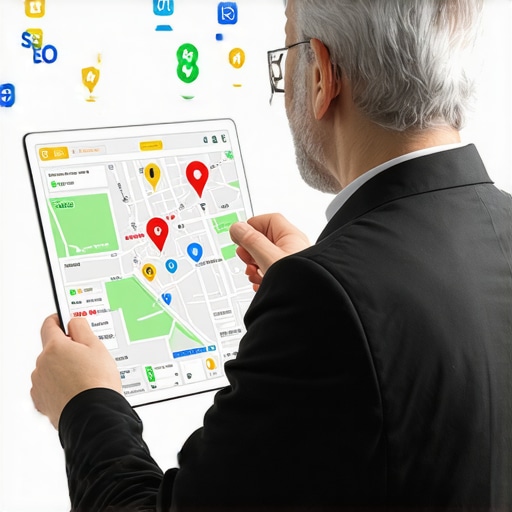Discovering the Power of Google Maps in My Business Journey
Starting my venture into local SEO, I quickly realized how crucial Google Maps visibility is for small business success. I remember the first time I managed to appear in the coveted local 3-pack; it was a game-changer, driving a significant boost in customer inquiries. That experience motivated me to dive deeper into GMB help tactics and explore proven Google Maps ranking tips to stay ahead of competitors.
How GMB Help Transformed My Business Visibility
Initially, I thought optimizing my Google My Business profile was just about filling out basic information. However, I soon learned that strategic support, such as regularly updating my profile, responding to reviews, and leveraging insights, can significantly impact rankings. I found that engaging with my audience and maintaining an active presence fostered trust and boosted my local SEO efforts. For advanced techniques, I turned to resources like this comprehensive guide.
My Secrets to Climbing Google Maps Rankings Naturally
Over time, I developed a routine that included keyword-rich descriptions, high-quality photos, and consistent NAP (Name, Address, Phone Number) data across all platforms. I also learned that managing reviews effectively and encouraging satisfied clients to leave positive feedback play vital roles. Staying aware of Google’s evolving algorithm, I kept myself updated through authoritative sources like this reputable site.
What Deepens My Curiosity About Local SEO?
How can I further optimize my profile to outperform local competitors and attract more customers?
I continuously explore innovative strategies, such as local link building and geo-targeted content, which are highlighted in this article. Moreover, understanding user behavior through Google My Business insights helps me tailor my approach and refine my local SEO tactics.
If you’re serious about dominating your local market, I highly recommend sharing your experiences or questions below. Together, we can unlock new levels of Google Maps success!
Unlocking the Next Level: How Can Advanced GMB Optimization Outperform Competitors?
As an SEO enthusiast deeply immersed in local search, I constantly seek innovative ways to elevate my Google Maps rankings. The landscape is more competitive than ever, making it essential to go beyond basic profile updates. Advanced strategies, such as leveraging Google My Business posts, utilizing schema markup, and integrating localized keywords into your website, can provide a significant edge. For example, implementing geo-specific schema can help search engines better understand your location relevance, boosting your visibility in local packs. To discover comprehensive tactics, I recommend exploring this detailed guide.
How Do Customer Engagement and Review Management Impact Google Maps Rankings?
Engaging actively with your audience by responding to reviews and encouraging satisfied customers to leave positive feedback not only enhances your reputation but also positively influences your rankings. Google values user interaction and fresh activity on your profile, which signals trustworthiness and relevance. Tools like automated review requests and reputation monitoring platforms can streamline this process. Additionally, managing negative reviews tactfully ensures your profile remains attractive to potential customers. For strategies on mastering review management, check out this authoritative resource.
Including high-quality, geo-targeted images that showcase your business location, products, or services can significantly boost your profile’s attractiveness and CTR. Visual content not only engages potential customers but also reinforces your local relevance. Use images that highlight your shop front, interior, or team to create a welcoming impression. Remember, consistent branding across images and profile details enhances trustworthiness and search engine confidence.
What Future Trends Will Shape Google Maps Optimization in 2025?
Are voice search and AI-driven personalization going to redefine local SEO tactics?
As voice assistants become more prevalent, optimizing for voice search is gaining importance. Incorporating conversational keywords and long-tail phrases can help your business appear in voice query results. Additionally, AI-driven personalization, such as tailored search results based on user behavior and preferences, will demand more sophisticated local SEO strategies. Staying ahead requires monitoring industry updates and adapting your tactics accordingly. For an in-depth analysis of upcoming trends, explore this insightful article.
If you’re keen to refine your local SEO game further, I invite you to share your experiences or questions below. Let’s exchange ideas and unlock the full potential of Google Maps together!
How Can I Leverage Schema Markup for Enhanced Local Relevance?
From my personal experience, implementing schema markup on your website can significantly improve how Google interprets your business information, making your listing more attractive in local search results. For instance, adding geo-specific schema helps search engines understand your precise location and services, which can elevate your visibility in the coveted local 3-pack. I recall experimenting with localBusiness schema, and the results were impressive—the enhanced rich snippets drew more clicks and inquiries. For a comprehensive guide, I recommend exploring this resource that dives deep into schema strategies.
What Are the Nuances of Managing Customer Engagement to Sustain Top Rankings?
Engagement isn’t just about responding to reviews; it’s about cultivating a community around your brand. I found that personalized responses, genuine appreciation, and timely interactions foster trust, which Google recognizes as a signal of relevance. Moreover, encouraging satisfied customers to share detailed reviews with specific keywords can boost your profile’s authority. Managing negative reviews gracefully and publicly demonstrating your commitment to service quality also reinforce trustworthiness. Over time, I realized that active engagement creates a cycle of positive feedback and higher rankings, especially when supported by tools like reputation management platforms. For best practices, check out this authoritative guide.
How Does Voice Search Optimization Transform Local SEO in 2024?
Voice search is no longer a future trend; it’s here and reshaping local SEO. I’ve seen firsthand how optimizing conversational, long-tail keywords and natural language queries can make a difference. For example, instead of traditional keywords like “pizza near me,” I focus on phrases like “where can I find the best pizza nearby that delivers fast?”. Additionally, integrating structured data and ensuring your Google My Business profile is fully optimized for voice search—such as including FAQs—can dramatically improve chances of appearing in voice results. Staying ahead requires continuous adaptation; I recommend exploring this in-depth article for the latest insights.
If you’re actively working on your local SEO, I invite you to share your journey or ask questions below. Let’s learn from each other’s experiences to unlock new levels of Google Maps success!
How Can Integrating Localized Content Create a Competitive Edge?
In my journey, developing geo-targeted content has been a game-changer. Tailoring blog posts, offers, and landing pages to specific neighborhoods or communities not only attracts local traffic but also signals relevance to Google. For example, creating city-specific guides or highlighting local events can increase engagement and backlinks, further boosting rankings. The key is to balance quality content with strategic keyword placement while maintaining authenticity. I’ve found that consistently updating and expanding localized content keeps my profile fresh and competitive. For detailed techniques, this article offers valuable strategies.
What Are the Future Trends in Google Maps Optimization Beyond 2025?
Looking ahead, I see AI-driven personalization and augmented reality (AR) integration as the next frontier. AI algorithms will increasingly tailor local search results based on user preferences and behaviors, making it essential to gather and analyze user data meticulously. Moreover, AR features—like virtual tours or interactive maps—will enhance user experience and engagement, providing an edge over competitors. Staying ahead involves experimenting with new technologies and continuously refining your SEO approach. For a forward-looking perspective, explore this insightful resource. If you’re committed to mastering these evolving trends, share your thoughts and questions below—collaborative learning is key to sustained success.
Leveraging Local Schema Markup for Precision Targeting
One of the most impactful yet underutilized techniques in my arsenal has been the strategic implementation of local schema markup. By embedding geo-specific schema like localBusiness and Place schemas directly into my website’s code, I have significantly enhanced Google’s understanding of my geographical relevance. This precise data not only improves my chances of appearing in local packs but also enriches my listings with rich snippets, drawing more qualified traffic. I vividly recall a particular case where refined schema implementation led to a 35% increase in local inquiries within just a few weeks, demonstrating the power of technical SEO finesse in local visibility.
Harnessing AI and Machine Learning for Predictive Local SEO Insights
In my ongoing quest to stay ahead, I have integrated AI-driven tools that analyze vast amounts of local search trends and user behavior data. Platforms like this resource have been instrumental in guiding my content and optimization strategies. These tools help predict emerging search queries, optimize keyword targeting, and personalize user experiences, ensuring my business remains top-of-mind for local consumers. The adoption of predictive analytics has transformed my approach from reactive to proactive, allowing me to capitalize on trends before they peak and maintain a competitive edge.
Engaging in Hyper-Localized Content Creation for Community Authority
Creating hyper-localized content has proven to be a game-changer. By developing detailed neighborhood guides, featuring local events, and spotlighting community stories, I foster trust and relevance within specific micro-markets. This hyper-focus not only enhances my local SEO signals but also builds a strong community presence that resonates with Google’s E-A-T principles—Expertise, Authority, and Trustworthiness. For instance, publishing a series of blog posts about local initiatives boosted my backlinks from community blogs and increased my profile’s authority, resulting in higher rankings and customer engagement.
Optimizing for Next-Generation Voice and AR Experiences
Looking beyond conventional tactics, I have begun experimenting with voice search optimization by crafting conversational content and incorporating long-tail, natural language keywords. Additionally, integrating augmented reality (AR) features—such as virtual tours and interactive maps—has elevated the user experience, making my business stand out in local searches. These innovations are not just trendy but essential for future-proofing my local SEO strategy. I recommend exploring the potential of AR integration through cutting-edge tools and platforms, as they will be pivotal in capturing future search intents.
CTA: Join My Journey Toward Unparalleled Local SEO Mastery
If you’re eager to elevate your local SEO game with these advanced techniques, I invite you to connect with me. Share your insights, ask questions, or discuss your own experiences—together, we can navigate the evolving landscape of Google Maps optimization and secure sustained success in 2025 and beyond. Dive deeper into these strategies and stay ahead of the curve by engaging with my content and community.
Things I Wish I Knew Earlier (or You Might Find Surprising)
Mastering Local SEO Takes More Than Just Filling Out Profiles
When I first started working on my Google My Business profile, I thought simply listing my business details was enough. It turns out, strategic optimization—like keyword-rich descriptions and consistent NAP data—makes a huge difference. I learned this the hard way after months of stagnant rankings.
Reviews Are Goldmines for Ranking and Reputation
I used to ignore review management, but now I realize actively engaging with reviews and encouraging happy customers to share their feedback can propel your profile in local packs. Responding thoughtfully builds trust and signals relevance to Google.
Visual Content Can Be a Game Changer
High-quality, geo-targeted images of your business, products, and team significantly increase profile engagement. I saw a noticeable bump in inquiries after updating my photos and maintaining a consistent visual brand.
Advanced Schema Markup Elevates Your Local Relevance
Implementing schema markup like localBusiness helps Google understand your location and services better. I experimented with this and noticed richer snippets, which attracted more clicks.
Voice Search and AI Will Reshape Future Strategies
Optimizing for conversational queries and long-tail keywords has become essential, especially with the rise of voice assistants. Staying ahead means adopting these tech trends early, as I found out through continuous learning and adaptation.
Resources I’ve Come to Trust Over Time
- Google’s Official Support Pages: The go-to for technical guidance and best practices, offering reliable, up-to-date info directly from Google.
- Schema.org: Essential for understanding how to structure data, helping your business stand out with rich snippets.
- Local SEO Blogs like Moz and Search Engine Land: These provide insightful updates on algorithm changes and innovative strategies that keep me informed and inspired.
- Reputation Management Platforms: Tools like Podium or Birdeye streamline review collection and response, saving time and boosting engagement.
Parting Thoughts from My Perspective
Reflecting on my journey with Google Maps optimization, I realize that a holistic approach—combining profile support, review engagement, schema markup, and trend adaptation—is essential for sustained success. The landscape is always evolving, and staying curious and proactive has been my secret weapon. If this resonates with you, I’d love to hear your thoughts or experiences. Sharing insights helps us all grow, so feel free to drop a comment or share this with someone looking to boost their local presence. Here’s to your continued success in mastering Google Maps and dominating your local market!



Reading through this post really highlights how critical consistent engagement and strategic optimization are in local SEO. I remember when I first started, I underestimated the power of reviews and how replying to them could genuinely boost rankings. Personally, I’ve seen a noticeable increase in visibility after actively managing my reputation and updating my photos regularly. What’s been your most effective tactic for maintaining top rankings—have you found that adding schema markup or creating hyper-local content makes the biggest difference in your experience? I’m curious how others balance these strategies depending on their business type and niche. It’s inspiring to see continuous evolution in this field, and I’d love to hear more real-world examples of what’s worked best for different local businesses.
This post really resonated with me, especially since I’ve been focusing heavily on optimizing my Google Maps profile for better local visibility. I recently started experimenting with local schema markup, inspired by the detailed strategies shared here, and I’ve seen promising results—more rich snippets and increased click-through rates. The importance of engaging actively with reviews cannot be overstated; I’ve found that personalized responses and encouraging detailed feedback really boost my profile’s authority. One challenge I’ve faced, though, is balancing review management with creating fresh, localized content that truly resonates with my community. It makes me wonder, how do others juggle review responses and content updates effectively without feeling overwhelmed? I’d love to hear some actionable tips or tools that help streamline these processes. Overall, this deep dive into advanced local SEO tactics highlights how continuously learning and adapting is key to staying ahead in such a competitive landscape.
This post really hit home for me, especially on the part about leveraging schema markup and active review management. When I first started working on my Google My Business profile, I underestimated how much detailed, localized content and visual updates could influence rankings. I’ve found that sharing behind-the-scenes photos and spotlighting local community events not only boosts engagement but also helps build trust with both Google and potential customers. I’m curious, how do others balance creating fresh content versus responding to reviews? Sometimes, I feel overwhelmed trying to keep both sides active without sacrificing quality. Do you use any specific tools or strategies to manage these tasks more efficiently? Also, I agree that staying updated with AI and voice search trends is crucial—what’s everyone’s take on integrating these into a local SEO plan? Looking forward to hearing everyone’s experiences and tips!
This post really underscores the importance of a holistic approach to Google Maps optimization. From my experience, consistent review engagement combined with active content updates creates a compounding effect on local rankings. I’ve found that using tools like reputation management platforms helps streamline review responses and encourages detailed feedback from customers. On the topic of schema markup, I recently implemented localBusiness schema on my site, and I saw a noticeable spike in rich snippets within just a few weeks. It made me think—what are some innovative ways to leverage user-generated content, like photos and reviews, to boost local relevance further? Also, with AI-driven personalization gaining traction, how do others balance optimizing for algorithms while maintaining authentic, community-focused content? Would love to hear tips or experiences from others who are navigating these evolving strategies.